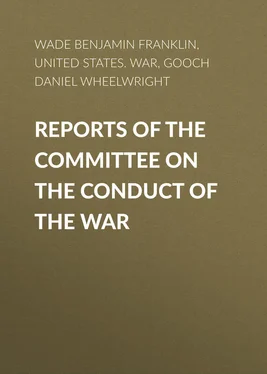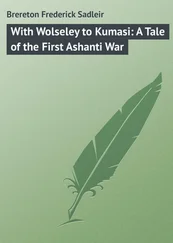Benjamin Wade - Reports of the Committee on the Conduct of the War
Здесь есть возможность читать онлайн «Benjamin Wade - Reports of the Committee on the Conduct of the War» — ознакомительный отрывок электронной книги совершенно бесплатно, а после прочтения отрывка купить полную версию. В некоторых случаях можно слушать аудио, скачать через торрент в формате fb2 и присутствует краткое содержание. Жанр: История, foreign_antique, foreign_prose, на английском языке. Описание произведения, (предисловие) а так же отзывы посетителей доступны на портале библиотеки ЛибКат.
- Название:Reports of the Committee on the Conduct of the War
- Автор:
- Жанр:
- Год:неизвестен
- ISBN:нет данных
- Рейтинг книги:3 / 5. Голосов: 1
-
Избранное:Добавить в избранное
- Отзывы:
-
Ваша оценка:
- 60
- 1
- 2
- 3
- 4
- 5
Reports of the Committee on the Conduct of the War: краткое содержание, описание и аннотация
Предлагаем к чтению аннотацию, описание, краткое содержание или предисловие (зависит от того, что написал сам автор книги «Reports of the Committee on the Conduct of the War»). Если вы не нашли необходимую информацию о книге — напишите в комментариях, мы постараемся отыскать её.
Reports of the Committee on the Conduct of the War — читать онлайн ознакомительный отрывок
Ниже представлен текст книги, разбитый по страницам. Система сохранения места последней прочитанной страницы, позволяет с удобством читать онлайн бесплатно книгу «Reports of the Committee on the Conduct of the War», без необходимости каждый раз заново искать на чём Вы остановились. Поставьте закладку, и сможете в любой момент перейти на страницу, на которой закончили чтение.
Интервал:
Закладка:
Question. With a musket or pistol?
Answer. I think it was a carbine; it may have been a musket, but my impression is that it was a carbine. Soon after I was shot I was robbed. A secesh soldier came along, and wanted to know if I had any greenbacks. I gave him my pocket-book. I had about a hundred dollars, I think, more or less, and a gold watch and gold chain. They took everything in the way of valuables that I had. I saw them robbing others. That seemed to be the general way they served the wounded, so far as regards those who fell in my vicinity. Some of the colored troops jumped into the river, but were shot as fast as they were seen. One poor fellow was shot as he reached the bank of the river. They ran down and hauled him out. He got on his hands and knees, and was crawling along, when a secesh soldier put his revolver to his head, and blew his brains out. It was about the same thing all along, until dark that night.
I was very weak, but I finally found a rebel who belonged to a society that I am a member of, (the Masons,) and he got two of our colored soldiers to assist me up the hill, and he brought me some water. At that time it was about dusk. He carried me up just to the edge of the fort, and laid me down. There seemed to be quite a number of dead collected there. They were throwing them into the outside trench, and I heard them talking about burying them there. I heard one of them say, "There is a man who is not quite dead yet." They buried a number there; I do not know how many.
I was carried that night to a sort of little shanty that the rebels had occupied during the day with their sharpshooters. I received no medical attention that night at all. The next morning early I heard the report of cannon down the river. It was the gunboat 28 coming up from Memphis; she was shelling the rebels along the shore as she came up. The rebels immediately ordered the burning of all the buildings, and ordered the two buildings where the wounded were to be fired. Some one called to the officer who gave the order and said there were wounded in them. The building I was in began to catch fire. I prevailed upon one of our soldiers who had not been hurt much to draw me out, and I think others got the rest out. They drew us down a little way, in a sort of gulley, and we lay there in the hot sun without water or anything.
About this time a squad of rebels came around, it would seem for the purpose of murdering what negroes they could find. They began to shoot the wounded negroes all around there, interspersed with the whites. I was lying a little way from a wounded negro, when a secesh soldier came up to him and said: "What in hell are you doing here?" The colored soldier said he wanted to get on the gunboat. The secesh soldier said: "You want to fight us again, do you? Damn you, I'll teach you," and drew up his gun and shot him dead. Another negro was standing up erect a little way from me; he did not seem to be hurt much. The rebel loaded his gun again immediately. The negro begged of him not to shoot him, but he drew up his gun and took deliberate aim at his head. The gun snapped, but he fixed it again, and then killed him. I saw this. I heard them shooting all around there – I suppose killing them.
By the chairman:
Question. Do you know of any rebel officers going on board our gunboat after she came up?
Answer. I don't know about the gunboat, but I saw some of them on board the Platte Valley, after I had been carried on her. They came on board, and I think went in to drink with some of our officers. I think one of the rebel officers was General Chalmers.
Question. Do you know what officers of ours drank with them?
Answer. I do not.
Question. You know that they did go on board the Platte Valley and drink with some of our officers?
Answer. I did not see them drinking at the time, but I have no doubt they did; that was my impression from all I saw, and I thought our officers might have been in better business.
Question. Were our officers treating these rebel officers with attention?
Answer. They seemed to be; I did not see much of it, as they passed along by me.
Question. Do you know whether or not the conduct of the privates, in murdering our soldiers after they had surrendered, seemed to have the approval of their officers?
Answer. I did not see much of their officers, especially during the worst of those outrages; they seemed to be back.
Question. Did you observe any effort on the part of their officers to suppress the murders?
Answer. No, sir; I did not see any where I was first carried; just about dusk, all at once several shots were fired just outside. The cry was: "They are shooting the darkey soldiers." I heard an officer ride up and say: "Stop that firing; arrest that man." I suppose it was a rebel officer, but I do not know. It was reported to me, at the time, that several darkeys were shot then. An officer who stood by me, a prisoner, said that they had been shooting them, but that the general had had it stopped.
Question. Do you know of any of our men in the hospital being murdered?
Answer. I do not.
Question. Do you know anything of the fate of your quartermaster, Lieutenant Akerstrom?
Answer. He was one of the officers who went with me to meet the flag of truce the last time. I do not know what became of him; that was about the last I saw of him. I heard that he was nailed to a board and burned, and I have very good reason for believing that was the case, although I did not see it. The first lieutenant of company D of my regiment says that he has an affidavit to that effect of a man who saw it.
Question. Have you any knowledge in relation to any of our men being buried alive?
Answer. I have not, other than I have stated.
By Mr. Gooch:
Question. How long had your regiment been in Fort Pillow?
Answer. We reached there the 8th of February. There were no other troops there then, and we held the place alone for some time.
By the chairman:
Question. By whom were you ordered there?
Answer. By General W. S. Smith, chief of cavalry, and also by General Hurlbut.
Question. What other troops were there at the time of the fight?
Answer. Four companies of the 6th United States heavy artillery, colored, and a battery called now, I think, the 2d United States light artillery. It was before the 1st Tennessee light artillery, colored.
Question. What was about the number of our force there?
Answer. Not far from 500 men.
Question. Do you know what became of Major Bradford?
Answer. He escaped unhurt, as far as the battle was concerned. I was told the next morning on the boat that he had been paroled. I did not see him after that night.
Question. Do you know why you were left unsupported, as you were, when it was known that Forrest was in your vicinity?
Answer. I do not know why, unless it was thought that he would not attack us. I think it was supposed that he was going to make an attack on Memphis.
By Mr. Gooch:
Question. What do you estimate Forrest's force to have been?
Answer. From all I could see and learn, I should suppose he had from 7,000 to 10,000 men.
Question. Is there anything further you desire to state?
Answer. I heard some of the rebels talking during the night after the fight. They said we ought to have surrendered when we had the opportunity, but that they supposed the Yankees were afraid the colored troops would not be treated as prisoners of war; and they intimated that they would not be; and said it was bad enough to give to the "home-made Yankees" – meaning the Tennessee soldiers – treatment as soldiers, without treating the negroes so, too.
On the morning of the fight there was so much hurry and confusion that our flag was not raised for a time; we had been firing away an hour before I happened to notice that our flag was not up. I ordered it to be raised immediately, and our troops set up vociferous cheers, especially the colored troops, who entered into the fight with great energy and spirit.
Читать дальшеИнтервал:
Закладка:
Похожие книги на «Reports of the Committee on the Conduct of the War»
Представляем Вашему вниманию похожие книги на «Reports of the Committee on the Conduct of the War» списком для выбора. Мы отобрали схожую по названию и смыслу литературу в надежде предоставить читателям больше вариантов отыскать новые, интересные, ещё непрочитанные произведения.
Обсуждение, отзывы о книге «Reports of the Committee on the Conduct of the War» и просто собственные мнения читателей. Оставьте ваши комментарии, напишите, что Вы думаете о произведении, его смысле или главных героях. Укажите что конкретно понравилось, а что нет, и почему Вы так считаете.












